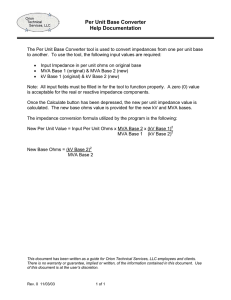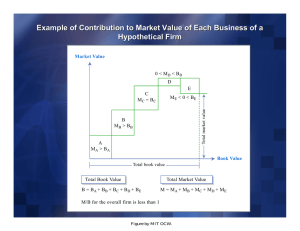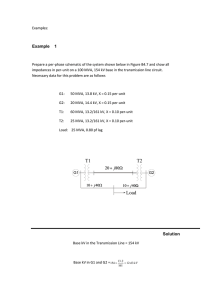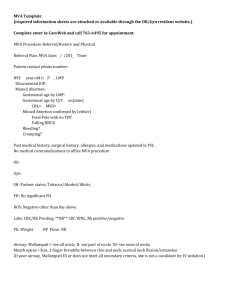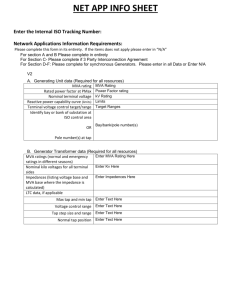Market Value Analysis (MVA): City of Wilmington, DE
advertisement
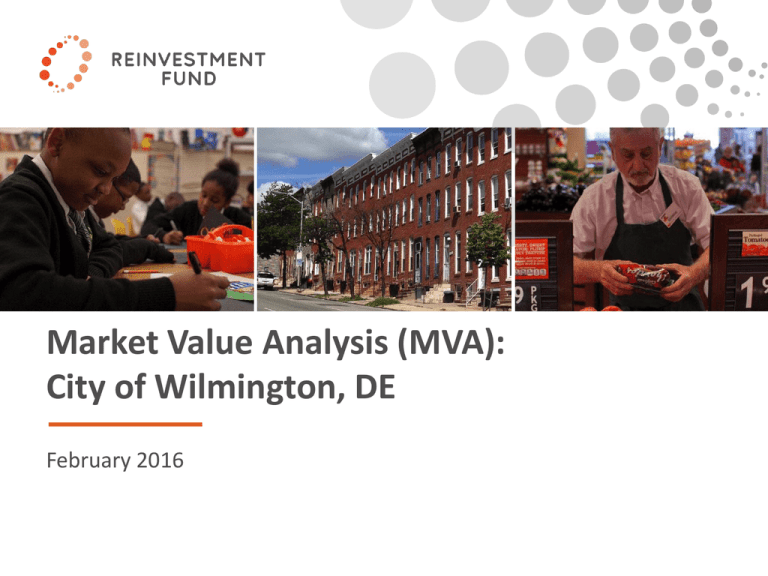
Market Value Analysis (MVA): City of Wilmington, DE February 2016 Profile of Reinvestment Fund Reinvestment Fund builds wealth and opportunity for low-wealth communities and low and moderate income individuals through the promotion of socially and environmentally responsible development. We achieve our mission through Capital. Grants, loans, and equity investments Knowledge. Information and policy analysis Innovation. Products, markets, and strategic partnerships In general The Market Value Analysis (MVA) is a tool designed to assist the private market and government officials to identify and comprehend the various elements of local real estate markets. It is based fundamentally on local administrative data sources. By using an MVA, public sector officials and private market actors can more precisely craft intervention strategies in weak markets and support sustainable growth in stronger market segments. Who is using the MVA? MVAs have been funded by government agencies, local foundations, and financial institutions in cities and counties around the country: • Philadelphia, PA • New Orleans, LA • Washington, DC • State of Delaware • Baltimore, MD • Detroit, MI • San Antonio, TX • Houston, TX • Camden, NJ • Milwaukee, WI • Newark, NJ • Pittsburgh, PA • Selected (8) NJ regions • St. Louis, MO • Reading Area, PA • Jacksonville, FL • Atlantic City, NJ • Wilmington, DE (in process) • Prince George’s County, MD (in process) • Indianapolis, IN (in process) • Selma, AL (in process) Recently Completed MVAs St Louis, MO Duval County, FL Houston, TX Pittsburgh, PA Recently Completed MVAs Reinvestment Funds’s First Statewide MVA: Delaware Our Normative Assumptions When analyzing markets we begin with these principles: • The best decisions are based on the sound and objective analysis of quantitative and qualitative data • Public subsidy is scarce; acting alone subsidies cannot create a market • Public subsidy must leverage private investment • All residents are customers with an expectation of quality public services and amenities • In distressed markets, “Build from Strength” major institution of place o transportation hub o environmental amenities o Preparing an MVA 1 2 Acquire local administrative data and geocode to Census block group geographies. 3 Manually inspect and validate data layers by driving the area. Use statistical cluster analysis to identify areas with common attributes. Iterative 4 5 Manually inspect areas for conformity with local experts to assess fit 6 Alter parameters; re-solve and re-inspect until model accurately represents area Summarize and describe the characteristics of each market Lessons from 15+ years of experience Validating Data is Critical. Geographic Scale Matters. One Size Does Not Fit All. Integrate Local Knowledge. Researchers must visit the city to understand the data. Census tract and MSA geographies are too large to accurately reflect local markets. Measurement scales and the appropriate number of clusters are different in every city. The MVA model is tested with local experts to incorporate qualitative feedback from each geography. See Slide 36 for our validation routes Wilmington MVA Components Wilmington MVA Components Attributes of Market Conditions: • • • • • • • • • Median Sales Price, 2013-14 Variation in Sales Price, 2013-14 Foreclosure Filings, 2013-14 Owner-Occupancy Rate, 2010 Residential Building Permits Greater Than $5,000, 2013-14 Rental Units with Subsidy, 2014 Vacant Residential Parcels, 2014 Non-residential Land Area, 2014 Percent Investor Sales, 2013-14 Wilmington Census Block Groups *Number of Residential Sales, 2013-14 * Not an MVA component Median Sales Price, 2013-14 Variation in Sales Price, 2013-14 Foreclosure Filings as a % of Res. Parcels, 2013-14 % Owner Occupied, 2010 % of Parcels with Residential Building Permits greater than $5,000, 2013-2014 % of Occupied Rental Units with a Subsidy, 2014 % Vacant Residential Parcels, 2014 % Non-residential Land Area, 2014 % Investor Sales, 2013-2014 Selected Areas Close-up of MVA Component Data Items Approximate Area: West of I95, Lancaster to 6th Approximate Area: West of I95, Lancaster to 6th Approximate Area: West of I95, Lancaster to 6th Approximate Area: West of I95, Lancaster to 6th Approximate Area: East of Concord, Jefferson to Market Approximate Area: East of Concord, Jefferson to Market Approximate Area: East of Concord, Jefferson to Market Approximate Area: East of Concord, Jefferson to Market Wilmington MVA Wilmington MVA Identified Block Group Splits MVA Category Characteristics MVA Category A B C D E F G H Not Classified Study Area Median Sales # of Price, BGs 2013-2014 7 $ 343,444 13 $ 215,393 16 $ 115,795 9 $ 59,672 7 $ 34,598 10 $ 32,399 10 $ 21,289 4 $ 13,378 4 76 NULL $ 110,876 Foreclosure Subsidized Variance Permits as a % % Owner Vacancy as a % Filings as % of rental as a % of Sales Price, of Res. Parcels, Occupied, of Res. Res. Parcels, All Renter 2013-2014 2013-2014 2010 Parcels, 2014 2013_2014 Occupied, 2014 0.52 6.8% 74.8% 1.2% 0.6% 0.3% 0.37 3.9% 47.1% 1.1% 1.5% 7.9% 0.55 2.6% 54.5% 3.0% 2.2% 16.7% 0.68 2.3% 57.5% 4.4% 3.3% 22.9% 0.72 1.4% 55.5% 5.5% 3.7% 18.0% 0.89 1.9% 32.7% 14.7% 5.9% 15.4% 0.81 1.7% 49.7% 7.1% 5.0% 35.8% 1.09 1.6% 35.1% 13.4% 7.1% 16.8% % Nonresidential Land, 2014 21.0% 50.3% 43.6% 33.1% 63.4% 38.1% 21.9% 66.8% Percent Investor Sales, 2014 4.0% 5.9% 20.3% 23.0% 45.2% 39.2% 47.9% 32.8% NULL 1.3% 8.6% 7.6% 5.2% 74.0% 76.3% 75.0% 0.65 2.8% 51.0% 5.5% 3.3% 16.9% 40.9% 25.7% Note: 4 block groups were removed due to lack of sales, and 1 block group was removed as non-residential 2010 Census Characteristics MVA Cluster A B C D E F G H Not Classified Study Area Total Households Owner Occupied Renter Occupied Housing Units Population Sales Price 2013-2014 Number Percent Number Percent Number Percent Number Percent Number Percent Median Average 2,371 8.3% 1,900 13.9% 471 3.1% 2,571 7.8% 4,939 7.0% $343,444 $379,319 5,078 17.7% 2,282 16.7% 2,796 18.7% 5,466 16.7% 8,793 12.4% $215,393 $219,827 6,181 21.6% 3,009 22.0% 3,172 21.2% 7,033 21.4% 14,711 20.8% $115,795 $122,687 2,940 10.3% 1,514 11.1% 1,426 9.5% 3,307 10.1% 6,911 9.8% $ 59,672 $ 75,260 2,125 7.4% 1,140 8.3% 985 6.6% 2,377 7.2% 7,396 10.4% $ 34,598 $ 48,716 2,719 9.5% 904 6.6% 1,815 12.1% 3,450 10.5% 8,692 12.3% $ 32,399 $ 45,605 2,743 9.6% 1,309 9.6% 1,434 9.6% 3,328 10.1% 8,294 11.7% $ 21,289 $ 32,233 527 1.8% 158 1.2% 369 2.5% 704 2.1% 1,573 2.2% $ 13,378 $ 29,629 3,931 28,615 13.7% 1,440 13,656 10.5% 2,491 14,959 16.7% 4,584 32,820 14.0% 9,542 13.5% 70,851 Note: 4 block groups were removed due to lack of sales, and 1 block group was removed as non-residential Null Null $110,876 $123,569 Validation Route Neighborhood Look-in: Hilltop St. Francis Hospital How Others Are Using the MVA Building local strategies from the MVA… Consider important block groupspecific data as overlays to the MVA Including: • Demographic (current/trend) • Economic conditions • Quality of schools • Access to transportation • Proximity to employment opportunities • Crime rate • Presence of arts/culture • Commercial services • Public & private prior investment into arts, CBOs and open space • Number of/proximity to anchor institutions Use block group-specific attributes such as sale prices vacancy and foreclosure rates to inform action. Using the MVA: Set Priorities by Market Cluster MVA Market Types Sample Activities A B C D E Demolition of Dangerous Properties Encapsulation: Acquisition/Rehab Large Scale Housing Development (e.g., LIHTC) Land Assembly for Redevelopment Each activity can be connected to different responsible organizations, including city agencies, commissions, nonprofits, etc. Selective Enhancement of Lots Quality of Life Code Enforcement (broken window syndrome) Nuisance Abatement Some activities represent annual expenses; others represent investments with an expectation of longer term returns beyond the immediate beneficiaries. Some are “universal” while others are best targeted. Arts & Culture Programming Neighborhood Marketing Campaign Enhanced Public Safety Measures Support Nutrition Services Income Maintenance Programs The Market Value Analysis allows for a coordination across organizations, agencies and funding sources (CDBG, CSBG, philanthropic, etc.). F Uses of the MVA Assess markets as part of a local land banking strategy (Phila.) Guide capital budget (Detroit) Focus code enforcement (Phila., Baltimore) Benchmark quality of life measures (Phila.) Target statewide Strong Neighborhoods Revolving Loan Fund (DE/DSHA) Develop CDGB comprehensive plan (Detroit, Wilmington, St. Louis) Assess changes in the market over time (Phila., Baltimore, Pittsburgh) Evaluate development opportunities (Pittsburgh, Phila., Houston, Detroit, St. Louis, cities in NJ) Target demolition and acquisition activities (Baltimore, Phila., Detroit) Select transformative, tipping point projects (Phila., Baltimore, Pittsburgh) Engage partners – philanthropic, non-profit, government – in coordinated efforts to rebuild neighborhoods (Baltimore, Milwaukee) Guide federal Neighborhood Stabilization Program Investment (States of PA & NJ, Houston, Detroit) Duval County (Jacksonville, FL) Job Centers (Jobs per mi2) Duval County (Jacksonville, FL) Home Sales by Party Type TRF Policy Solutions Team Ira Goldstein, President ira.goldstein@reinvestment.com Michael Norton, Chief Policy Analyst michael.norton@reinvestment.com Bill Schrecker, Research Associate bill.schrecker@reinvestment.com
